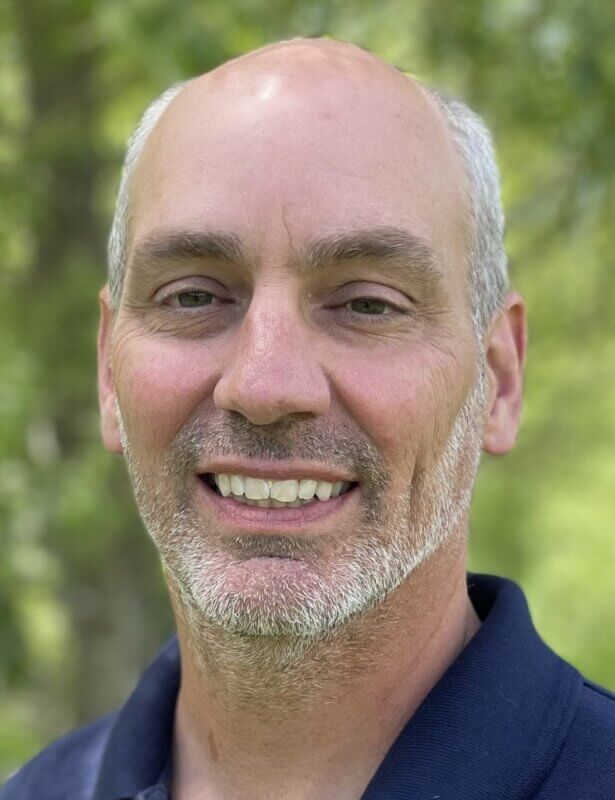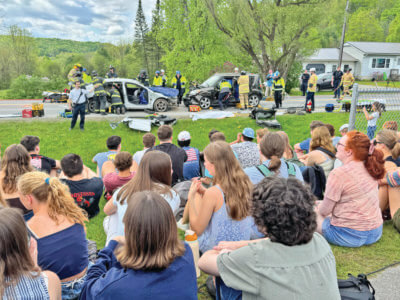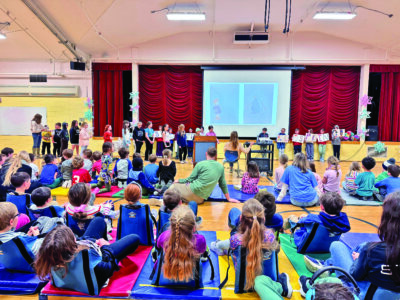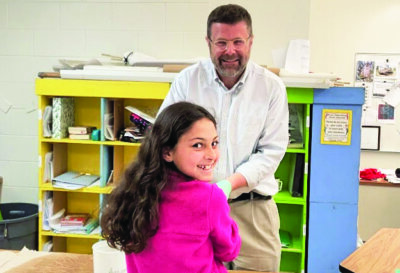News from Charlotte Central School Students
Fifth grade celebrates Law
Lucinda Smith and Louise Brines
Charlotte Central School Students
Regina Coco taught the fifth grade about laws on May 1, which is known as International Workers Day, Labor Day and Law Day. Coco works in immigration law as the staff attorney at the U.S. Committee for Refugees and Immigrants in Colchester.
During her presentation, the fifth graders got to learn about immigration law. Immigration law is the law you have to pass to enter, leave or become a citizen in a country.
We learned about migration, which is where someone moves from another country. The difference between forced and voluntary migration is that when you’re forced you may need to leave because of a natural disaster or a war. Voluntary migration is where you choose to leave your home country because you want a better chance in the U.S. or you might come here for better opportunities.
Coco also talked about push-and-pull factors. Pull factors of immigration mean to move voluntarily to a foreign country. Push factors are negative and mean you are forced into moving due to war, religion or other factors.
Some other stuff that was discussed was the difference between refugees and asylees. Refugees are people with permission from the U.S. government to come to the country. They normally want permission because they are outside their country, and they fear persecution if they go back or have already been persecuted. Persecution is to be punished.
Did you know 125,000 refugees get permission to come to the U.S. every year, but only 50,000 to 75,000 end up in the U.S. because of security and other stuff? An asylee is someone already in the U.S. when they ask for protection from the U.S. government; they need to have a reasonable fear of persecution if they return to their home country.
In 2020, the height of COVID, refugees stopped coming and going from countries so they would not get COVID. The same thing happened at schools and work offices; you might have had to stop going to school or work while the pandemic swept through North America.
In Vermont about one in 20 residents are foreign born, which means a lot of people in Vermont aren’t born in America. They could have been born in another country, then because of different opportunities, they decided to come to Vermont.
If your parents weren’t born in the U.S. and then got naturalized, then you automatically become a U.S. citizen, even if you weren’t born in the U.S. More than half of the refugees in Vermont become citizens.
Out of the 20 million refugees around the world, 40 percent are children. The refugee resettlement program has nine steps. First is the United Nations High Commissioner for Refugees (UNHCR) identification and referral. Next is the Resettlement Support Center Africa interviews. Third is U.S. Citizenship and Immigration Services interviews. Phew, this is a lot of interviews. Next is approval or denial. This is one of the most important steps as it decides whether you can continue the resettlement process. Fifth is medical examinations to make sure you don’t carry any disease into the U.S. The next step is cultural orientation, so when you go to the U.S. you don’t end up not knowing anything about the history and culture of the country. Step 7 is to travel to the U.S. Step 8 is working hard and learning English to fit in and get a job. The last step is to start safely living in the U.S. and start becoming a citizen.
If you are a refugee and want to become a citizen then you have to do the naturalization process. The first step in this process is to apply for a green card (permanent resident visa) then wait a year. Step 2 is to make your declaration of intention, which is a pledge under oath that you intend to pledge your allegiance to the U.S. A special thing that the U.S. has is it does not require you to renounce your loyalty to other countries like other countries do; you only have to pledge allegiance to the U.S. The third step is to get your fingerprints checked in case you are a criminal from another country. The next step of the naturalization is to pass an interview and citizenship test with the U.S. Citizenship and Immigration Services; all applicants have to take the test in English. Once you pass the test you attend a ceremony and pledge your loyalty to the U.S. and promise to obey the laws, then you take the oath of allegiance.
Once you are done with that process, you then have all rights and duties that citizens of blood do. The only thing you cannot do that citizens of blood can do is run for president or vice president.
The NexTrex Challenge
Lincoln Mclaughlin
Charlotte Community School Student
Last year, Charlotte Central school started the NexTrex challenge, which is a challenge to gather 1,000 pounds of plastic to be turned in for a bench for Charlotte Central School. Teacher Julia Beerworth, who runs the seventh and eighth grade student council, helped start the challenge.
The current eighth and ninth grade student council started the NexTrex challenge. “The NexTrex challenge is a step to having an eco-friendly school and recycling in school and out.” All of the plastic gets collected from the school and gets weighed by student council members and then brought to grocery stores by the Charlotte Central School sustainability committee to be collected by NexTrex.
NexTrex’s goal is to reduce the amount of household plastic and make it Trex’s wood substitute that outdoor furniture and a sustainable, splinter-free decks can be made of.
Some seventh and eighth grade student council members seemed super passionate about helping make this world a cleaner place. They said they think, if other schools did this, it would positively affect the planet and result in a cleaner school and environment.
Overall, the NexTrex challenge is an amazing program that supports the environment while making beautiful long-term furniture and decks, while making the world a better place. It makes you feel good that the zip-lock bag you donated is going to a great cause.
Charlotte Central School jazz band
Annie Palmer
Charlotte Central School Student
The Charlotte Central School jazz band is a group of sixth-eighth grade students who meet before school, working to dazzle the community with outstanding performances.
With jazz band coming to an end for this school year, the Charlotte Central School jazz band will be featured in many events including: Champlain Valley School District Jazz Night on May 14, Charlotte Central School’s spring concert on May 28 and Burlington’s Discover Jazz Fest on June 5.
The Charlotte Central School Press sat down with Andy Smith, who has taught band and jazz band for many years.
Question: How many years have you taught jazz band?
Answer: Thirty-one years, I think it was 17 here at Charlotte.
Question: What is different about teaching jazz band than regular band?
Answer: Jazz band has an element of improvisation, which is where a different type of creativity comes up. So, we start to learn about musical theory, which improvisation means to make it up. Concert band is more about interpreting something a composer made up.
Question: Is there anything that makes this year’s jazz band stand out from past jazz bands?
Answer: Every jazz band every year has something very unique and special about it. This year our rhythm section has an older demographic, whereas our horn section has a younger demographic.
Furthermore, what’s very interesting about this particular demographic is that the older students in the band give guidance to the younger members, and the younger band members carry a lot of weight and exceed the expectations for their age.
Another thing that’s very special about this year’s jazz band is that this is my last jazz band. Next year, due to schedule changes, I will not be able to teach jazz band, so I am passing the baton over to Mr. Gribnau.
Question: Is there anything you would tell students thinking about doing jazz band next year?
Answer: I would encourage everybody to do jazz band. It expands our musical vocabulary. There are many fun, exciting opportunities to perform, including the CVSD jazz festival and the discover jazz festival, and everyone has the ability to do it. Furthermore, it’s a great way to represent our school and our community. It’s been one of the highwater marks of my career.
Next year, Chris Gribnau will be teaching jazz band, and we’re very excited for a great jazz band next year with him. If you are going into sixth, seventh or eighth grade at Charlotte Central School and have played an instrument in band for at least a year, you should look into doing jazz band next year. It’s a super-fun experience that is highly recommended to anyone.
Charlotte Central School play ‘Willy Wonka Jr.’
Lucy Palmer
Charlotte Central School Student
On Friday, March 21, students auditioned for this year’s Charlotte Central School school play, “Willy Wonka Jr.”
The cast list was posted on Tuesday, March 25, and can be found on the Charlotte Central School Theatre website. Practices started on April 1, and shows are on June 5, 6 and 7 in the Charlotte Central School multipurpose room. We interviewed some of the cast members to get their take on the play.
Eddie Moore, sixth grader, has the role of Mr. Salt.
Question: Are you excited for the play?
Answer: I am very excited for the play.
Question: Are you happy with the role you got? Is it your original choice?
Answer: Yes, I am happy with my role. I originally wanted to be an Oompa Loompa, but the director said I have a role with lines but no singing solo.
Question: Have you ever been in a play before?
Answer: Other than making up a few skits, no.
Annie Palmer, sixth grader, has the role of Violet Beauregarde.
Question: Are you excited for the play?
Answer: Yes.
Question: Are you happy with the role you got? Was it your original choice?
Answer: It was not my original choice, but I am very happy with my role.
Question: Have you ever been in a play before?
Answer: Yes. I did the Very Merry Theatre play “Winnie-the-Pooh” two years ago.
Related Stories
Popular Stories
If you enjoy The Charlotte News, please consider making a donation. Your gift will help us produce more stories like this. The majority of our budget comes from charitable contributions. Your gift helps sustain The Charlotte News, keeping it a free service for everyone in town. Thank you.
Bill Regan, Chair, Board of Directors







